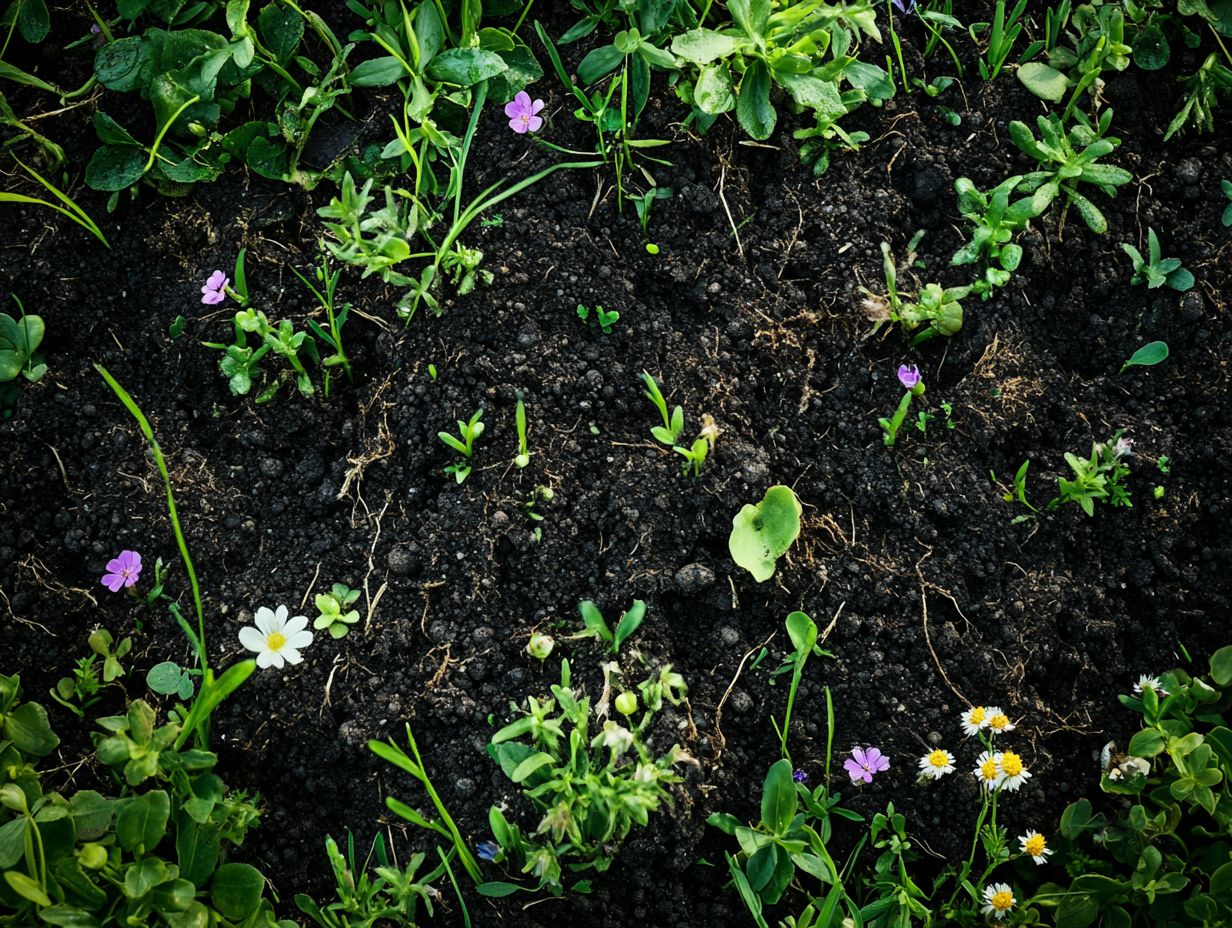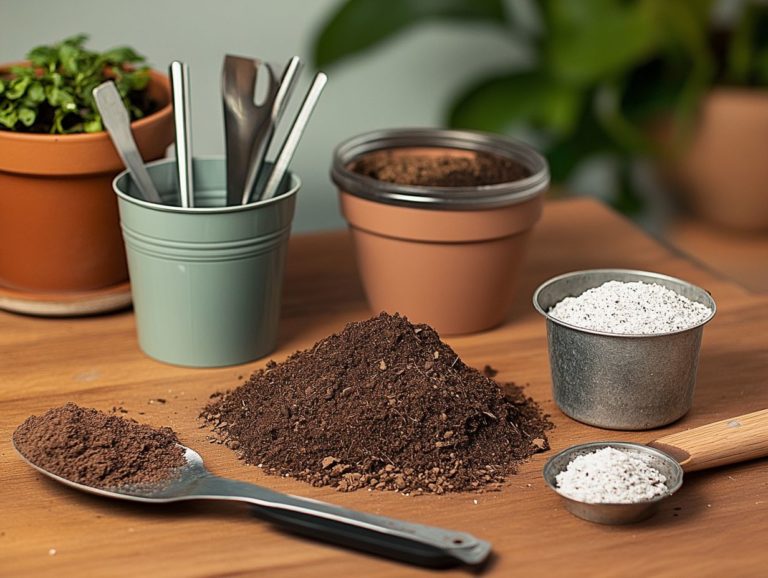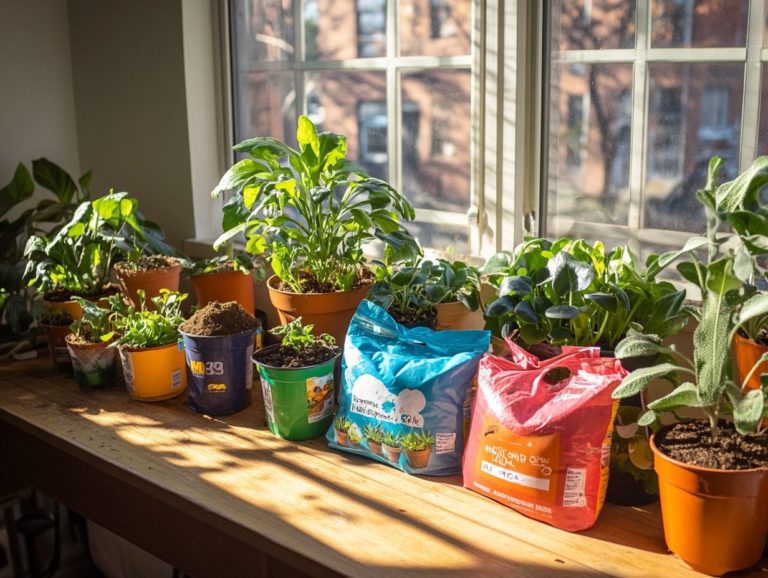The Importance of Soil Microorganisms
Soil microorganisms and beneficial microbes play an indispensable role in maintaining the health of ecosystems, yet they often remain underappreciated.
These tiny organisms cycle nutrients and break down dead matter. They are vital for creating healthy soil and ensuring its fertility. By understanding how they enhance plant growth and improve soil quality, you can truly grasp their importance in agricultural systems and environmental sustainability.
However, human activities present serious threats to these vital communities. Let s explore how these tiny heroes work and discover insights on how to protect and support these essential microorganisms for a healthier planet.
Contents
- Key Takeaways:
- The Role of Soil Microorganisms in Ecosystems
- The Benefits of Soil Microorganisms
- Threats to Soil Microorganisms
- Human Activities and Environmental Factors
- Ways to Support Soil Microorganisms
- Practices for Promoting Healthy Soil
- Frequently Asked Questions
- 1. What are soil microorganisms and why are they important?
- 2. How do soil microorganisms contribute to nutrient cycling?
- 3. Why are soil microorganisms important for plant growth?
- 4. How do soil microorganisms affect soil structure?
- 5. What are some human activities that can negatively impact soil microorganisms?
- 6. How can we promote the growth of beneficial soil microorganisms?
Key Takeaways:

- Soil microorganisms are crucial for healthy ecosystems.
- They enhance plant growth and soil quality, leading to better productivity.
- Human actions can harm them, but we can implement practices that protect soil health.
What are Soil Microorganisms?
Soil microorganisms, including a diverse array of bacteria and fungi, are essential players in maintaining soil health and fertility. These tiny yet mighty organisms are at the heart of numerous ecosystem interactions and processes, affecting everything from nutrient cycling to plant growth.
By breaking down organic matter and making nutrients available, soil microorganisms nurture biodiversity, which is crucial for sustainable agriculture and ecological balance. Understanding these microorganisms is key to enhancing soil structure and boosting crop production, ultimately supporting food security and environmental sustainability.
Among these organisms, bacteria help convert nitrogen from the air into a form plants can use and shine for their roles in organic matter decomposition, while fungi excel at nutrient absorption and soil aggregation. Together, these microbial communities weave intricate networks that enhance nutrient cycling, allowing vital elements like phosphorus and potassium to become accessible to plants.
Moreover, soil microorganisms contribute to biocontrol, helping to suppress soil-borne diseases and reducing the reliance on chemical pesticides. Their impact goes beyond just fertility; they improve water retention and soil structure, establishing a foundation for resilient agricultural ecosystems capable of withstanding climate variability and promoting stability in food systems.
The Role of Soil Microorganisms in Ecosystems
Soil microorganisms play a pivotal role in the health of ecosystems, driving vital processes such as nutrient cycling, decomposition, and the maintenance of soil structure. Their interactions with plant roots and organic matter are fundamental to soil fertility, which not only supports successful agricultural systems but also fosters vigorous plant growth.
These microorganisms are instrumental in combating climate change by regulating greenhouse gases like carbon dioxide and methane, thereby enhancing soil carbon storage and bolstering overall ecosystem stability. Without the rich tapestry of microbial communities in the soil, the delicate balance of ecosystem interactions would face significant disruption.
Nutrient Cycling and Decomposition
Nutrient cycling and decomposition are essential processes driven by soil microorganisms. These tiny organisms break down organic matter, releasing vital nutrients back into the soil. This process enriches soil fertility and fosters the growth of beneficial plants, significantly enhancing food security.
By transforming dead plant and animal material into accessible nutrients, these microbes ensure that crucial elements like carbon and nitrogen influence soil health and agricultural productivity. The intricate relationships within microbial communities sustain the balance necessary for optimal plant growth.
Microorganisms such as bacteria, fungi, and protozoa each have unique roles in this complex web of life. Beneficial bacteria excel at breaking down organic materials and helping to bind soil particles, thereby enhancing soil structure. However, pathogenic bacteria may surface, reminding us of the dynamic and sometimes fragile balance within the ecosystem.
The decomposition process is vital for humus formation, creating rich organic matter that improves the soil’s moisture retention and nutrient-holding capacity.
In essence, the interplay among these microorganisms not only facilitates nutrient cycling but also emphasizes the importance of maintaining healthy organic matter levels. These levels are crucial for sustainable agricultural productivity and ecological balance.
Soil Formation and Health

Soil formation is an intricate dance influenced by many factors, with microbial communities playing a vital role in enhancing soil health and structure. These microorganisms break down parent material, creating soil organic matter that boosts nutrient retention and overall fertility.
By engaging in soil remediation and facilitating the formation of aggregates, they contribute to improved soil structure an element critical for effective water purification and robust crop production. Healthy soils enriched by diverse microbial populations form the backbone of sustainable agriculture and food security, especially in the face of climate change.
The complex interplay among soil microorganisms, plants, and environmental conditions works in harmony to nurture a resilient agroecosystem. These microbial agents don t just aid in the decomposition of organic matter; they are also vital players in nutrient cycling, transforming complex compounds into forms that plants can readily absorb.
Promoting microbial biodiversity is essential to combat soil erosion and enhance the soil’s capacity to store water. This increases resilience against drought. Embracing sustainable agricultural practices like crop rotation and minimal tillage fosters a thriving microbial community. This ensures that soils remain productive and continue to support diverse ecosystems for generations to come.
Explore sustainable farming techniques today to protect our vital soil ecosystems!
The Benefits of Soil Microorganisms
The advantages of soil microorganisms go well beyond their mere presence. They are essential players in promoting plant growth, enriching soil fertility, and ensuring the sustainability of agricultural practices.
These microorganisms, including aerobic bacteria, are instrumental in nutrient cycling. They break down complex organic materials to release vital nutrients for plants. Additionally, they establish symbiotic relationships with plant roots, especially in the rhizosphere, which is the area around plant roots where beneficial microorganisms assist with nutrient absorption.
Maintaining healthy microbial communities is crucial for food security and strong agricultural systems.
Improving Plant Growth and Nutrition
Soil microorganisms are essential players in the game of plant growth and nutrition. They work especially through their interactions in the rhizosphere. These beneficial microbes enhance nutrient availability and help plants absorb critical elements like nitrogen and phosphorus, which are vital for strong plant development.
By forming mutual relationships that help both plants and microbes, they strengthen plants’ resilience against diseases and stressors. This promotes sustainable agricultural practices.
Their positive impact on soil health boosts crop yields and fortifies overall food security. Thus, they are essential to effective agricultural systems.
Take, for instance, beneficial bacteria like Rhizobium. They establish a mutual relationship with legumes, converting atmospheric nitrogen into a form that plants can absorb easily. Similarly, mycorrhizal fungi extend root systems, improving phosphorus uptake while enhancing soil structure.
These interactions supercharge nutrient acquisition, making our soils healthier and more productive! They also cultivate a diverse microbe community in the rhizosphere, which further enriches soil fertility and health.
Such interactions highlight the importance of integrating microbial strategies into agricultural practices. By encouraging organic farming methods, we can harness these natural processes to grow healthier, more sustainable crops.
Enhancing Soil Quality and Productivity
Enhancing your soil quality and productivity relies on the vibrant presence of diverse microorganisms that help maintain soil health and fertility. These microorganisms play a key role in forming soil organic matter, which is essential for retaining moisture and nutrients. This process ultimately elevates soil quality.
By facilitating nutrient cycling and nurturing healthy microbe communities, they significantly boost soil productivity, leading to impressive agricultural yields.
This partnership between microorganisms and soil highlights the critical importance of sustainable agricultural practices that prioritize the well-being of the soil ecosystem and its capacity to ensure food security.
Using methods like crop rotation and cover cropping helps these tiny helpers thrive while fostering biodiversity within the soil. These practices preserve soil structure and combat erosion while increasing organic matter levels.
By minimizing chemical inputs, you encourage a balanced microbe community, which enhances nutrient bioavailability.
As you cultivate healthier soils, you create a resilient foundation that can withstand adverse conditions, ensuring sustainable productivity. Ultimately, nurturing these microscopic allies paves the way for a thriving agricultural landscape, equipped to meet both current and future food demands.
Threats to Soil Microorganisms

Soil microorganisms face many threats that can disrupt their populations and functions. Human activities and environmental factors play a critical role in this disruption.
Practices like intensive agriculture and the excessive use of chemical fertilizers can harm microbial diversity, ultimately reducing soil health and fertility. Environmental pollutants like heavy metals and greenhouse gases seriously threaten these vital microbe communities. They interfere with nutrient cycling and can adversely affect plant growth.
It is crucial to address these threats to protect the essential roles that soil microorganisms fulfill in both ecosystems and agricultural productivity.
Human Activities and Environmental Factors
Human activities and environmental factors significantly impact soil microorganisms, often leading to detrimental effects on their populations and functions. You might not realize that practices like over-farming, using synthetic fertilizers, and growing the same crop repeatedly can severely disrupt microbial communities, ultimately reducing soil health and fertility.
Environmental pollutants, including heavy metals and greenhouse gases such as methane and nitrous oxide, pose serious threats to the natural balance of soil ecosystems. Understanding these impacts is crucial for developing strategies that protect and promote healthy microbial populations, which are essential for sustainable agriculture.
Prioritize biodiversity in your agricultural practices by rotating crops and integrating cover crops. This approach enhances microbial diversity and resilience. Reducing the use of chemical fertilizers and opting for organic alternatives can help restore the natural nutrient cycle, fostering a healthier soil microbiome.
Minimizing tillage and implementing conservation practices will protect existing microorganisms from disruption. It s also vital to regulate and remediate polluted sites, employing living organisms to clean up contaminated soil that utilizes microorganisms to degrade harmful contaminants. Act now to adopt these solutions for a sustainable agricultural future, ensuring soil health for generations to come.
Ways to Support Soil Microorganisms
Supporting soil microorganisms is crucial for maintaining healthy soils and fostering sustainable agricultural practices. By implementing strategies such as organic farming, crop rotation, and reduced tillage, you can significantly enhance the diversity and activity of soil microbial communities.
Incorporating compost and organic matter into the soil not only enriches it but also provides essential nutrients that promote microbial growth and function. By adopting these practices, you can improve soil health, enhance nutrient cycling, and ultimately increase crop production, all while contributing to food security and building resilience against climate change.
Practices for Promoting Healthy Soil
Promoting healthy soil involves implementing practices that nurture the vital soil microorganisms essential for nutrient cycling and soil fertility.
Incorporating organic matter, such as compost and cover crops, serves a dual purpose: it enriches the soil with essential nutrients while enhancing its structure and water retention capabilities.
Crop rotation is another invaluable strategy. It disrupts pest cycles and fosters a diverse microbial community that thrives on various root systems.
Reducing soil disturbance is key to maintaining the delicate balance of habitats within the soil ecosystem, protecting beneficial microorganisms from disruption.
These practices contribute to greater biodiversity, creating a vibrant community of organisms that collaborate to support sustainable agricultural systems.
Healthy, biodiverse soil is crucial not just for immediate productivity but also for the long-term resilience of the environment, ensuring fertile ground for future generations.
Frequently Asked Questions

1. What are soil microorganisms and why are they important?
Soil microorganisms are tiny living organisms such as bacteria, fungi, and protozoa that exist in soil. They are important because they play a crucial role in maintaining soil health and fertility, nutrient cycling, and plant growth.
2. How do soil microorganisms contribute to nutrient cycling?
Soil microorganisms play a vital role in breaking down organic matter and releasing nutrients such as nitrogen, phosphorus, and potassium into the soil. This process, known as nutrient cycling, is essential for plant growth and productivity.
3. Why are soil microorganisms important for plant growth?
Soil microorganisms help to decompose organic matter and release essential nutrients, making them available for plant uptake. They also form symbiotic relationships with plants, aiding in nutrient absorption and protecting them from diseases.
4. How do soil microorganisms affect soil structure?
Soil microorganisms help form and maintain soil structure. They bind soil particles together and create pore spaces for air and water movement. This improves drainage, aeration, and water retention, all vital for plant growth.
5. What are some human activities that can negatively impact soil microorganisms?
Human activities like excessive pesticide use, chemical fertilizers, and intensive tillage can harm soil microorganisms. These practices upset their natural balance and lead to a decline in soil health and fertility.
6. How can we promote the growth of beneficial soil microorganisms?
To encourage beneficial soil microorganisms, we should use organic fertilizers, reduce tillage, and practice crop rotation. These actions boost a thriving and diverse microbial community, which is essential for healthy soil!






